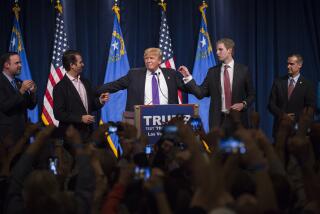COLUMN RIGHT : Spare the Rote, Spoil the Schoolchildren : Education requires a disciplined mind, not self-expression skills.
- Share via
School education in Western countries is rapidly losing the confidence of the public, and recent expressions of dismay by President Bush and the Prince of Wales merely reiterate what has become common knowledge. But what went wrong, and why? Some people blame the ‘60s, when the half-baked Marxism of our universities began to penetrate the lower schools. Others blame the democratic hostility to elites, and to the education that produces them. Some, with more reason, blame television, which has destroyed conversation, reading, hobbies and every other innocent pastime whereby people used to educate themselves. Others blame the collapse of discipline, which has surrendered the classroom to the bullies and the mischief-makers, and driven the best teachers from the schools.
All of these factors have been important. But they are only ripples on the stream of change, as much the effect of decline as the cause of it. More fundamental has been the habit of make-believe, and the refusal to see children as the really are.
It was once assumed that we realize our human potential only as adults; to become adults we must meanwhile be badgered, lectured, drilled and cajoled until the principles of morality, the arts of society and the rudiments of grammar have become second nature. While children were acknowledged to be innocent, theirs was not an innocence to be coveted, but a symbol of the higher purity to which we may, by grace and good behavior, aspire beyond the grave.
The wavering of religious certainty changed all of that. If we are alone in a godless world, then the memory of childhood, when we were protected by parental love and free from responsibility, becomes especially precious to us. With the dawning of the Enlightenment, therefore, people began to sentimentalize childhood, to imagine that the world of the child is more natural, more free, more creative than the world of the adult, and that the child exists in a state of moral purity, absolved from original sin. The child became the “noble savage” of Rousseau, and it was Rousseau’s “Emile” that articulated the new idea of education. Whereas the philosophers of antiquity had seen learning as a process of emulation, Rousseau saw it as a process of self-expression, which would release and enhance the child’s inner freedom and safeguard it for the future.
It is not Rousseau, however, whom we should blame for the state of schools today. Far more pernicious has been the American philosopher John Dewey, whose works have been standard sources of ideas in all of our schools of education.
Traditional schooling, according to Dewey, is mistaken in its fundamental premises. By imposing a body of knowledge on the child, it cancels his capacity for experiment and annihilates his creative potential. True education is a process of exploration, in which the child is master and tutor of his adult guardians. The sole responsibility of the teacher is to provide the pupil with opportunities for discovery.
For Dewey, learning means problem-solving: literature, history and culture are of no significance except in so far as they bear on the child’s present problems. Tradition has no authority, nor do the subjects of the old curriculum; indeed, with their artificial division of the world into unrelated segments, subjects are an obstacle to learning. Education should focus on the child as a living organism, and allow him the freedom of activity that will release his problem-solving powers.
This sentimental hogwash was dressed up by Dewey in pop biology, spiced with philosophical pragmatism and presented to the public with all the philistine self-assurance of the auto-didact. Unfortunately, Dewey’s thoughts hit the world of education just at the moment when educationists, losing confidence in the old curriculum, found themselves in need of a theory. It is to Dewey, therefore, that we owe the emphasis on “child-centered” learning, with its implication that the subject of study must be adapted to the child, rather than the child to the subject. It is to Dewey that we owe the “relevant curriculum,” which means in practice “relevant to the uneducated.” And it is Dewey who planted the seeds of hostility to tradition, to rote-learning, to examinations and to those hard, dry, academic subjects like Latin, calculus, grammar and four-part harmony, which in truth are the only things worth studying.
Traditional methods of education did not always work; after all, they produced John Dewey. But they worked far better than the modern substitutes. To return to them, however, we must learn to regard children as they really are, and that is the hardest part. It is here that the re-education of our teachers must begin.
More to Read
Sign up for Essential California
The most important California stories and recommendations in your inbox every morning.
You may occasionally receive promotional content from the Los Angeles Times.













